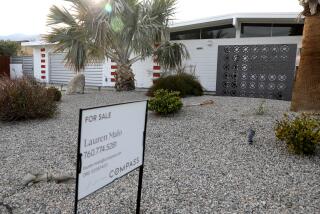Networks Make Real Estate Searches Easier : Brokers Team Up, Giving Firms a Single Contact With a National Reach
- Share via
NEW YORK — When Bernard Baber, who handles real estate for Seattle-based Airborne Freight Corp., needed a warehouse in New York and another in Hawaii, he didn’t have to worry about finding reliable real estate brokers 5,000 miles apart.
Baber just called David Blanchard, his contact at New America Network, a company that links independent commercial brokers in 180 markets around the country. New America has helped Baber close 57 deals during the past four years, and Blanchard was able to help him again by calling two New America affiliates, giving them Baber’s requirements and monitoring their search for warehouse space.
With Airborne expected to grow by 40% this year, according to Baber, consistency and control over brokerage services is essential. “Otherwise, the whole process would degenerate into chaos,” he said.
Advantages of Giants
New America is one of three networks of independent commercial real estate brokers formed to serve large companies with locations across the country. Pressure from clients who need help finding or disposing of space in distant markets isn’t the only impetus for joining a network. Brokers with high ambitions want to compete with the three biggest real estate companies, Cushman & Wakefield, Grubb & Ellis and Coldwell Banker Commercial Real Estate Services, each of which has more than 50 branches serving markets from Boston to Los Angeles.
For brokers who lack the desire or resources to set up and supervise an extensive branch system, joining a network that can duplicate many of the giants’ advantages seems an ideal solution.
“Personally, I was never attracted to (the idea of establishing) national and international branch offices,” said Edward S. Gordon, whose Edward S. Gordon Co. is one of New York’s biggest brokerages and is a founder of the member-owned, 11-year-old Office Network, which links the dominant independent real estate firms in 109 American markets and 10 foreign nations.
“That does not mean that we do not do national and international business,” he added. “What we require from the network is local market expertise, to save us the burden of acquiring it.”
The two other networks are Colliers International Property Consultants, an Australia-based company with a strong presence on the Pacific Rim, and New America Network, the largest in the United States.
What the networks offer corporate clients is a national reach and a single contact, who may be either the broker in the client’s hometown or a network staff member. They attempt to overcome the parochialism of local brokerages while capitalizing on the advantage of that same narrow focus: a deep understanding of a local market. Referrals are made from one affiliate to another, or from network headquarters to affiliates, as clients need services in different markets.
Needed Organization
Financial arrangements vary. Membership dues go as high as $100,000 a year, and networks take up to 10% off the top of commissions. Brokers who work on a deal negotiate a split of the rest up front.
“What the (brokerage) profession really needed was some way of organizing it so that a company could make one call and have whatever they needed--whether it was information, or disposing of 50 properties at the same time or buying 100 properties at the same time,” said Gerald Finn, a New Jersey developer who formed New America Network 10 years ago to answer corporate real estate executives’ complaints about brokers.
New America’s relationship with Airborne shows how networks function at their best. Baber had grown frustrated using local brokerages because they were inconsistent and viewed each assignment as a one-shot deal. He had tried national companies but found them sometimes indifferent to his special needs.
New America closes an Airborne deal somewhere in the United States every 10 days.
More to Read
Inside the business of entertainment
The Wide Shot brings you news, analysis and insights on everything from streaming wars to production — and what it all means for the future.
You may occasionally receive promotional content from the Los Angeles Times.










